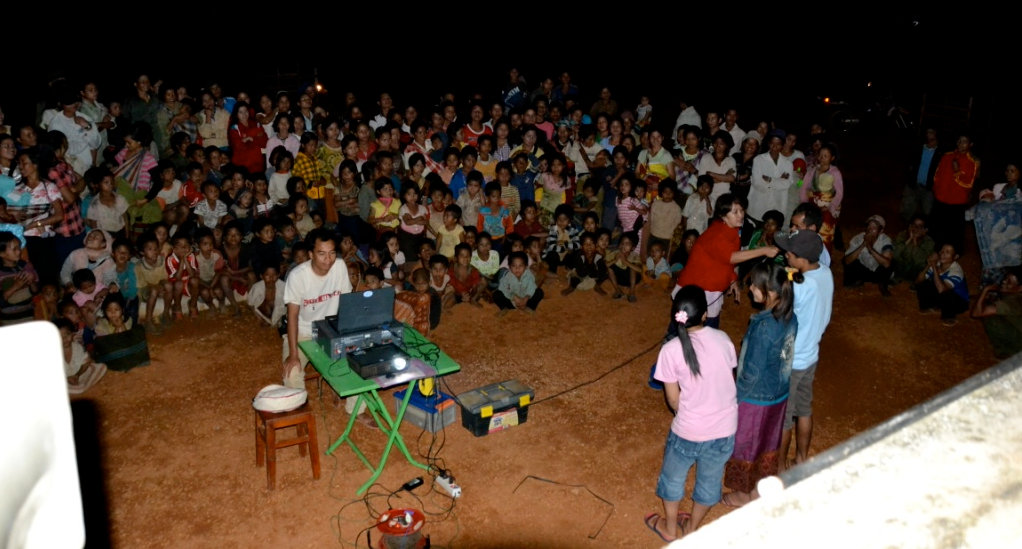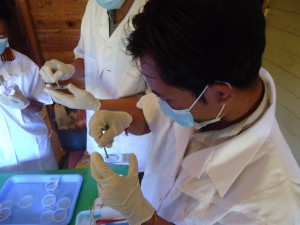Tuberculosis Control
Project to Support the Tuberculosis Control Program in Sekong Province
Providing access to tuberculosis diagnosis and treatment for all
This project ran from 2010 to 2014, as part of the WHO’s global program to fight tuberculosis. It was followed by our commitment to support the health system in the province.

Background
Tuberculosis remains a major public health problem in Laos. The poorest populations, living in remote areas that are difficult to access and often suffering from malnutrition, are the most affected and most have limited access to tuberculosis screening and treatment. To address this problem, the national tuberculosis control program was set up based on the « DOTS » strategy developed by the WHO. Its goal is to significantly reduce mortality related to the disease by giving everyone access to quality diagnosis and treatment.
The SFE has established a partnership with the National Tuberculosis Control Service of Laos to strengthen the implementation of the program in the province of Sékong by supporting the local tuberculosis service.

Objectives
- Improve case detection
- Improve patient follow-up in the taking of treatment
- Improve the quality of diagnosis
Activities
A number of activities have been developed taking into account contextual issues: difficult road access, ethnic languages, beliefs, disparate educational levels.
In the province of Sékong, access from remote mountain villages to hospitals and health centers is very difficult and sometimes requires several days of walking. As a result, people rarely travel to the medical center. Improving the detection of suspected cases therefore implies local sensitization of people.
The SFE has set up a multi-stage training program for health volunteers and people with responsibilities in the villages (e.g. village chiefs, women’s union leaders). They learn how to recognize the symptoms of the disease, how to manage suspicious cases by referring them to the health centers and how to ensure the daily follow-up of treatment. The mobile SFE team therefore travels to all areas of the province to conduct the trainings.
In addition, health education is conducted in the villages to raise awareness of the population on the means of prevention, symptomatology and treatment of the disease. The team takes the opportunity to follow up on patients under treatment and to monitor the family, especially children, who are at risk.
Improving the quality of diagnosis requires more qualified medical staff.
Continuous training sessions are organized for hospital laboratory staff, with the help of laboratory managers, in order to strengthen technical skills and to respond to technical needs if necessary.
Training sessions on diagnosis of different types of tuberculosis based on case study have been conducted for doctors and nurses of hospitals and health centers in the province.
Impact
- More than 850 health volunteers and 650 village representatives were trained and significantly improved their knowledge of tuberculosis and its treatment. Their involvement in the community has been important because 80% of TB patients reported having been screened by the health volunteers.
- A significant improvement in the quality of laboratory tests and clinical diagnosis was observed, resulting in a 54% increase in the number of cases detected and a 60% increase in the number of patients diagnosed as positive.

This project ran from 2009 to 2015, in collaboration with the WHO. It was followed by our commitment to support the health system in the province.

SFE tuberculosis project is part of the Lao country wide fight against TB, applying the DOTS strategy developed by WHO to reduce morbidity and mortality due to the disease by giving equitable access to high quality diagnosis and treatment. SFE is present in Sekong province since 2009 to provide medical support to provincial and district hospitals and to implement and optimize the quality of DOTS strategy at all levels (provincial and district hospitals, health centers and villages). SFE emphasize his action on the training of village health volunteers and medical staff to improve TB detection, on the training of laboratory staff to increase diagnosis effectiveness and on the improvement of laboratory activities related to TB diagnosis.
The project
Tuberculosis remains a major public health concern in Laos. Poverty, poor housing, lack of basic sanitation, malnutrition, lack of education and limited access to functional health services are factors that have an important impact on the development of the disease. The population, leaving in remote area far from the health services, is less susceptible to be detected and treated. To address this issue, the national tuberculosis program has been established to implement the DOTS strategy developed by WHO to reduce the tuberculosis burden.
Objectives
SFE supports the implementation of the national fight against tuberculosis in Sekong province, one of the poorest of the country, through a project aiming to:
- Improve the detection of tuberculosis
- Improve the monitoring of the patients
- Improve the quality of the diagnosis
Activities
To meet the objectives, activities have been developed and adapted to the local issues: road accessibility, ethnic language, beliefs, educational level. In Sekong province, access from the remote villages to district hospital or health centers is very poor and requires, in some cases, several walking days. Consequently, only a few people go to the dispensaries to be detected. Improvement of TB detection implies to work at village level with the health volunteers and to sensitize the population regarding the disease.
SFE has developed training sessions for village health volunteers and village authorities (village chief, woman union representative etc). They learn how to recognize the symptoms of the disease, how to do prevention, how to refer any suspect to the health centers for diagnosis, and how to control the patient daily treatment uptake. The SFE mobile team covers every zones of the province with the objective to train all the health volunteers. SFE mobile team also organizes community awareness in the villages to inform the population about the disease, its curability, the prevention and treatment. In addition, SFE mobile team monitors the TB patients in the village, specially the treatment uptake, and controls the family, with a specific attention to the children for any signs of the disease.
Good quality of diagnosis implies high qualified medical staff and good sample collection. The SFE organized specific training for the laboratory technicians, once a year, to review the microscopy technique used for TB diagnosis, to increase technical skills and address technical issues when necessary. The quality of the diagnosis relies not only on a good practical technique but also on the quality of the specimen. Indeed, several factors can alter the sputum sample (e.g. long exposure to heat during the time for sputum delivery to the district hospital) and impair the diagnosis. To face this issue, a pilot study was set to test the feasibility of making sputum smear slide at health center level (which is nearest to the village than the district hospital). This should increase the quality of the diagnosis and the number of cases detected from remote area. Specific training for dispensary staff on the sputum smear slide technique was performed and the quality of the slide made at dispensary level is regularly monitored. A global evaluation of the study will indicate if this strategy reaches its goal.
Indicators
- The training of the village health volunteers should result in an increase of case detection in remote area.
- The pilot study aiming to have the diagnostic slides made by health center staff should reveal whether this approach provide better slide quality and improve case detection from remote area.
- Training of the laboratory technicians on a regular base is expected to improve the quality of the diagnosis. This improvement will be assessed by the internal quality control performed by the national tuberculosis center.

